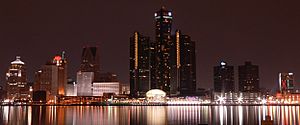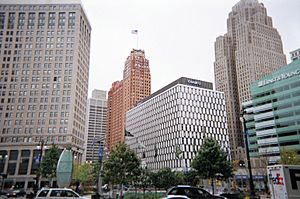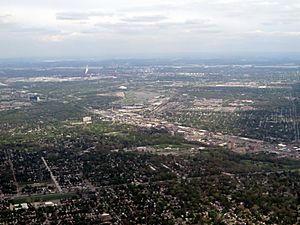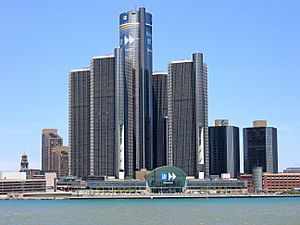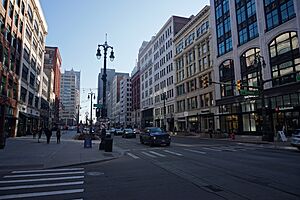Economy of metropolitan Detroit facts for kids
The Detroit area, also known as Metro Detroit, is a large region in Michigan with over 5.9 million people. It's a busy place with many businesses and a large workforce. Detroit is famous around the world as the "automobile capital" because many major car companies have their main offices here. In fact, jobs related to cars make up a big part of all jobs in the United States!
Metro Detroit is also a leader in new technologies like life sciences, computer technology, and advanced manufacturing. Michigan is one of the top states for jobs in high-tech fields. Even though there have been some tough times, the economy in Metro Detroit started getting better in 2010.
| Top publicly traded companies in Metro Detroit according to revenues with metro and U.S. rankings |
|||||
| Metro rank |
Corporation | US rank |
|||
|---|---|---|---|---|---|
| 1 | General Motors | 6 | |||
| 2 | Ford | 7 | |||
| 3 | Dow | 38 | |||
| 4 | Aptiv | 121 | |||
| 5 | Ally | 147 | |||
| 6 | TRW Automotive | 169 | |||
| 7 | Lear | 195 | |||
| 8 | Penske Automotive | 225 | |||
| 9 | Masco | 277 | |||
| 10 | Visteon | 282 | |||
| 11 | DTE Energy | 285 | |||
| 12 | Meritor | 346 | |||
| 13 | CMS Energy | 369 | |||
| 14 | Autoliv | 376 | |||
| 15 | Pulte Homes | 393 | |||
| 16 | Kelly Services | 437 | |||
| 17 | BorgWarner | 453 | |||
| 18 | Cooper Standard | 814 | |||
| 19 | Valassis | 809 | |||
| 20 | Affinia Group | 853 | |||
| 21 | American Axle | 874 | |||
| Source: Fortune See also: List of Michigan companies |
|||||
Contents
Real Estate and Business Growth
Metro Detroit has been a top spot for new businesses and expansions. From 2007 to 2009, it was fourth in the U.S. for new company locations among large metro areas. The region has a huge amount of office space, including big complexes like the Renaissance Center and Southfield Town Center.
Even with challenges, the area's economy has continued to grow. The housing market has become more affordable, attracting interest from people around the world. In 2011, Detroit was ranked as the third most affordable city in the U.S. for housing. It was also among the top five cities for job growth between 2010 and 2012.
Many successful real estate developers live in Metro Detroit. Some of the suburbs are very wealthy. There are all kinds of stores, from fancy shops to discount chains.
Michigan leaders started the Cool Cities Initiative to help rebuild city centers. More people moving into the region is expected to help Detroit grow even more. The city is also working to fix up its historic buildings.
Many companies like OnStar, Ally Financial, Compuware, and Quicken Loans have brought more jobs to downtown Detroit. Billions of dollars have been invested in the downtown area, creating new parks and developments along the Detroit International Riverfront.
Young professionals are choosing to live in downtown Detroit, enjoying a city lifestyle. Some are even moving to nearby wealthy areas like Grosse Pointe to be close to the city's exciting scene. Downtown Detroit was even named one of the best big city neighborhoods for retirement.
The Cobo Hall convention center, which hosts the big North American International Auto Show, has undergone major renovations.
Money and Banking
Metro Detroit is one of the top five financial centers in the U.S. It has offices for all the major accounting firms. Many large financial companies have a big presence here, including Quicken Loans, Ally Financial, and Comerica.
Quicken Loans, based in Detroit, is one of the largest home mortgage lenders in the U.S. The area also has many companies that help new businesses get started.
In 2011, Quicken Loans moved its main office to downtown Detroit, bringing about 4,000 employees from the suburbs. This was a big step for city planners who wanted to bring life back to the historic downtown. Also in 2011, Blue Cross Blue Shield of Michigan moved 6,000 of its employees to downtown Detroit.
Technology and Innovation
Metro Detroit is a leader in new technologies like life sciences, information technology, and advanced manufacturing. The region's technology sector is fifth in the U.S. for total jobs in tech. In 2010, Detroit became the fastest-growing area in the U.S. for high-tech jobs.
Downtown Detroit has a special wireless internet zone, and many tech jobs have moved there. Michigan has been a leader in making broadband internet available. The Michigan Information Technology Center helps tech companies in the region with education and support.
Many big technology and software companies have offices or headquarters in Metro Detroit, including Compuware, HP Enterprise Services, IBM, Google, and General Electric. Chrysler's main U.S. headquarters and technology center are in the Detroit suburb of Auburn Hills.
In 2015, Quicken Loans opened a new, modern Technical Center in Corktown. This facility has large server rooms and space for training and offices.
Learning and Research
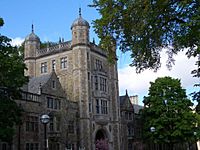
Metro Detroit has grown its economy by focusing on new technologies. Michigan is usually one of the top states for spending on research and development (R&D). In 2011, Detroit got the first U.S. Patent and Trademark Office outside of Washington, D.C.
Universities in the metro area provide many talented people for the region. The University of Michigan in Ann Arbor is one of the world's top research schools. Its engineering, medicine, business, and law schools are always highly ranked. In 2002, the state built the NextEnergy Center near Wayne State University to focus on developing new energy sources like fuel cells.
The area has many colleges and universities, including Eastern Michigan University, Lawrence Technological University, Oakland University, and University of Detroit Mercy.
On the Canadian side of the border, the University of Windsor and St. Clair College work with car makers on high-tech research and training.
Health and Medicine
Metro Detroit is a major center for healthcare in the U.S. A 2006 report showed that the region's healthcare industry supported hundreds of thousands of jobs. Major hospital networks include the University of Michigan Health System, Henry Ford, Beaumont, and Detroit Medical Center.
In 2010, Oakland University opened Michigan's fourth medical school, working with Beaumont Hospitals. This school helps create jobs in life sciences and research. Wayne State University in Detroit has one of the largest medical schools in the U.S.
The University of Michigan bought a large research facility in Ann Arbor in 2009 to create new jobs by working with businesses. From 2006 to 2009, the Detroit-Ann Arbor area attracted a lot of money for new biotechnology projects.
In 2012, two big construction projects started in Detroit: the Henry Ford Health System began a large revitalization project, and Wayne State University started building a new Integrative Biosciences Center.
Making Things and Industry
Metro Detroit is known as the world's car-making center. It's home to America's "Big Three" automakers: General Motors, Ford Motor Company, and Chrysler. Almost every major car company in the world has an office or design center here. The "Automation Alley" in Oakland County has over 1,800 advanced technology companies.
Even with competition from other countries, Detroit's carmakers have continued to grow. In 2010, they reported big profits, showing a strong comeback. The money made by just one Detroit car company can be more than all the top companies in many other U.S. cities combined.
The area also has many other types of manufacturers and is important for U.S. national security. The United States Army TACOM Life Cycle Management Command (TACOM) is based here, along with Selfridge Air National Guard Base. There are also important defense companies like General Dynamics.
Detroit's carmakers are building new types of vehicles, like hybrid cars that use both gas and electricity. They are also working on cars that can run on ethanol and vehicles powered by fuel cells. In 2009, Michigan and Detroit's auto industry received a lot of money from the U.S. government to make lithium-ion batteries, which were expected to create many jobs.
Buying and Selling Goods
The Greater Detroit Foreign Trade Zone (GDFTZ) was created in 1981 to help reduce taxes on goods crossing borders and to encourage international trade. In 2011, Metro Detroit was the fourth largest export market in the United States.
Detroit is the country's number-one exporting region and its busiest commercial port. The Ambassador Bridge is the busiest commercial border crossing in North America, handling a large amount of trade between the U.S. and Canada. Millions of people and vehicles cross the Ambassador Bridge and the Detroit-Windsor Tunnel every year. A study in 2004 showed that many jobs in the Detroit-Windsor area depend on this international border crossing. There are plans for a second bridge across the Detroit River to make trade and travel even easier.
Many people travel across the Detroit-Windsor border daily for work. The North American Free Trade Agreement (NAFTA) allows for easier movement of workers between the U.S. and Canada. For example, many nurses who work in Detroit hospitals live in Windsor, Canada.
Getting Around
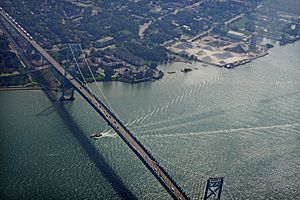
Metro Detroit has a full system of transportation services. The Michigan Department of Transportation manages the network of highways. Buses are provided by the Detroit Department of Transportation (DDOT) and the Suburban Mobility Authority for Regional Transportation (SMART). You can also take a bus across the border to Windsor, Canada.
A monorail system called the Detroit People Mover runs daily in a loop around downtown. Amtrak provides train service to Detroit, connecting it to cities like Chicago. There are also plans for a commuter train service that could link Ann Arbor, Detroit Metropolitan Airport, and downtown Detroit.
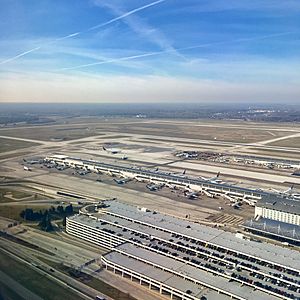
As a major U.S. port, Detroit is important for transportation and logistics, including air, rail, truck, and ship facilities. Detroit has a cruise ship dock. Commercial ships use Michigan's deep water ports, which connect to the Great Lakes Waterway and the Saint Lawrence Seaway.
Detroit Metropolitan Airport (DTW) is one of America's largest and most modern airports. It has many runways and is a hub for major airlines. Other commercial airports are in Flint and Toledo, Ohio. There are also smaller airports for charter flights and commercial aviation.
The U.S. Department of Transportation has given money for upgrades to high-speed rail between Chicago and Detroit. There are also plans for a new, larger rail tunnel under the Detroit River to handle more freight.
Fun Things to Do
Tourism is a big part of Metro Detroit's economy, providing many jobs. About 15.9 million people visit the area each year, spending a lot of money. Besides casinos, the most popular attraction is The Henry Ford, which is America's largest indoor-outdoor museum complex. The Detroit International Riverfront connects the Renaissance Center to parks, restaurants, and hotels with a riverfront walkway.
The region hosts large events that attract hundreds of thousands of people, like the Windsor-Detroit International Freedom Festival and the North American International Auto Show. The Midtown and New Center areas, with their museums and cultural centers, also bring in millions of visitors.
The area has hosted several major sporting events, including the Super Bowl XL and the NCAA Final Four. Detroit is one of only thirteen U.S. cities with teams in four major sports.
The Huron-Clinton Metroparks, a large network of parks, gets about nine million visitors every year. The Detroit River International Wildlife Refuge is a unique wildlife preserve located right in the middle of a major city.
Detroit is a center for entertainment, with casino resorts, sports venues, and a theater district. It's the largest American city to offer casino resort hotels.
Movie studios in the metro area are helping Michigan become a strong player in the film business. Motown Motion Picture Studios opened in 2009 and is expected to create many jobs in the film industry.
Shopping
Metro Detroit has many chain stores and large shopping malls, including both fancy and outlet-style places. While some older malls have closed or changed, new "lifestyle centers" have appeared in the suburbs. Many suburban towns like Birmingham and Royal Oak have their own street-side shopping areas.
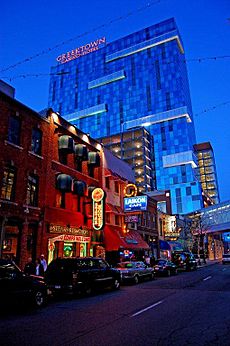
Within Detroit city limits, there are many local shops and restaurants, especially in areas like the Lower Woodward Avenue Historic District and the Greektown Historic District. However, the city of Detroit has fewer big chain stores. A 2007 survey found that many suburban residents visit downtown Detroit for dining and events.
A 2007 report showed that Detroit residents spent a lot of money in suburban stores. In 2009, the Meijer chain of super-centers announced it would open its first store within Detroit city limits at the Gateway Marketplace, which opened in 2013.
Grocery Stores
In 2009, the German supermarket chain Aldi and Michigan-based Spartan Stores were the main grocery chains in Detroit. In 2011, Whole Foods Market announced a new location in Midtown Detroit, which opened in 2013.
Many independent grocery stores serve Detroit neighborhoods. A 2009 report found that Detroit neighborhoods had enough income to support more grocery stores, and that large chains had been slow to see the city's potential for growth.
In 2011, it was noted that most supermarkets in Detroit were owned by Assyrian Americans. There are also several Hispanic supermarkets in Southwest Detroit that offer special meats, produce, and tortillas.
News and Media
As the center of the auto industry, the region is a major source for news about cars and business. The Detroit television market is the thirteenth-largest in the United States. Many people in Canada also watch Detroit TV stations. Detroit also has one of the largest radio markets in the U.S.
Movie Theaters
As of 2015, there was one movie theater in Detroit showing new movies: Bel Air 10. There are also independent theaters like the Detroit Film Theatre and the Redford Theatre.
Outside of Detroit, in the Metro Detroit area, there were many movie theaters in 2015, including large "megaplexes" with many screens. These theaters offer modern features like stadium seating. There are also IMAX options at places like The Henry Ford and the Michigan Science Center.
Important Moments in History
President Franklin Roosevelt called America the "Arsenal of Democracy" during World War II. Detroit and its car factories played a very important role in helping the Allies win the war. Henry Ford used his skills to mass-produce items for the war effort. For example, his Willow Run factory built the B-24 Liberator bomber, which was the most produced Allied heavy bomber in history. At its peak, the factory produced 650 bombers a month by 1944, helping to quickly change the balance of power in the war.
Largest Employers
Here are some of the biggest employers in Metro Detroit:
| Company/organization | Metro location | Full-time local employees |
Classification |
|---|---|---|---|
| Ford Motor Company | 1 American Road, Dearborn | 95,342 | Automotive |
| General Motors | 300 Renaissance Center, Detroit | 91,861 | Automotive |
| Stellantis North America | 1000 Chrysler Drive, Auburn Hills | 72,597 | Automotive |
| Detroit Public Schools | 3011 W. Grand Blvd., Detroit | 37,329 | Education |
| Rock Ventures | 1092 Woodward Ave., Detroit | 17,000 | Financial services |
| University of Michigan | Main Campus, Ann Arbor | 16,832 | Education and research |
| University of Michigan Health System | 1500 E. Medical Center Dr., Ann Arbor | 16,551 | Health care |
| U.S. Postal Service | 1401 W. Fort St., Detroit | 15,385 | Postal service |
| U.S. Government | 477 Michigan Ave., Detroit | 15,328 | Federal government |
| Henry Ford Health System | 1 Ford Place, Detroit | 15,139 | Health care |
| St. John Health System | 28000 Dequindre, Warren | 14,288 | Health care |
| City of Detroit | 2 Woodward Ave., Detroit | 13,762 | City government |
| Trinity Health | 27870 Cabot Dr., Novi | 13,012 | Health care |
| Beaumont Hospitals | 3601 W. 13 Mile Rd., Royal Oak | 15,638 | Health care |
| State of Michigan | Cadillac Place, Detroit | 11,177 | State government |
| Detroit Medical Center | 3800 John R., Detroit | 11,003 | Health care |
| Oakwood Healthcare Inc. | 1 Parklane Blvd., Dearborn | 7,515 | Health care |
| DTE Energy | 2000 Second Ave., Detroit | 7,188 | Energy company |
| Blue Cross Blue Shield of Michigan | 600 E. Lafayette Blvd., Detroit | 7,007 | Health care |
| HP Enterprise Services | 500 Renaissance Center, Detroit | 6,711 | Information technology |
| Comerica | 500 Woodard Ave., Detroit | 6,169 | Financial services |
| Wayne State University | 658 W. Kirby, Detroit | 5,046 | Education and research |
| Wayne County | 600 Randolph, Detroit | 5,091 | County government |
| Visteon | 1 Village Center Dr., Van Buren Township | 4,497 | Automotive |
| Johnson Controls | 49200 Halyard Dr., Plymouth | 4,205 | Automotive |
Images for kids
-
1001 Woodward in Downtown Detroit, redeveloped into high-rise condominiums
 | Victor J. Glover |
 | Yvonne Cagle |
 | Jeanette Epps |
 | Bernard A. Harris Jr. |


